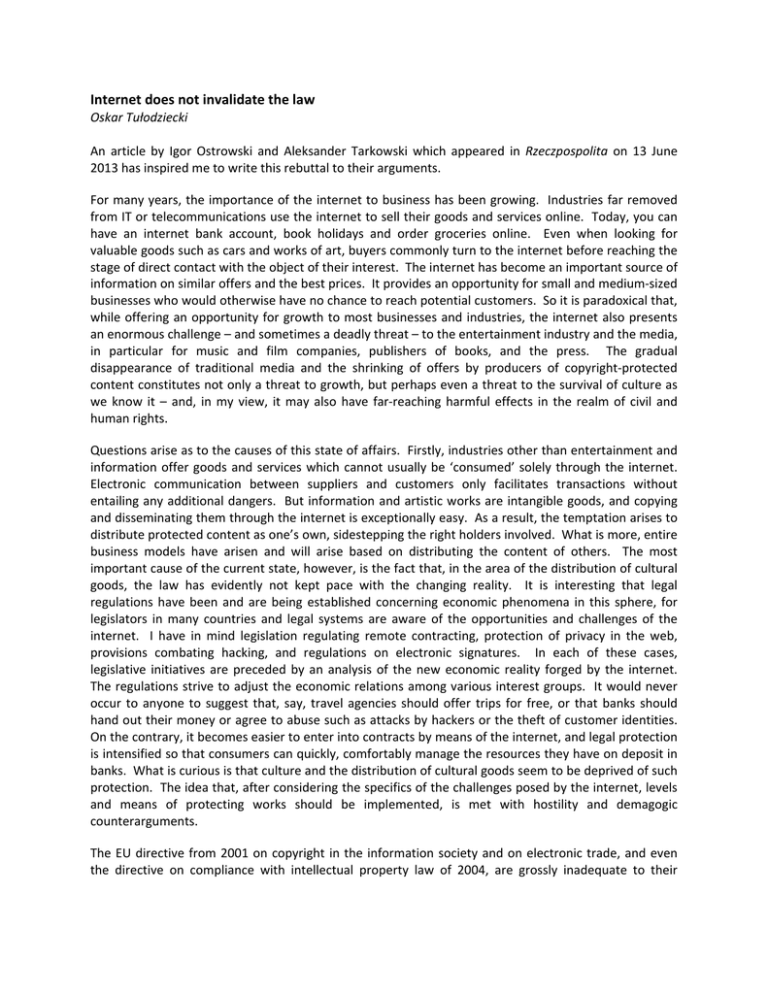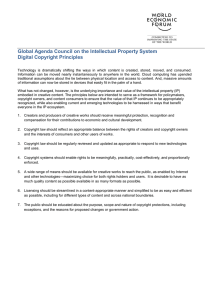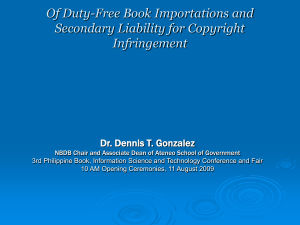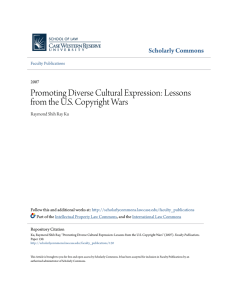Internet does not invalidate the law
advertisement

Internet does not invalidate the law Oskar Tułodziecki An article by Igor Ostrowski and Aleksander Tarkowski which appeared in Rzeczpospolita on 13 June 2013 has inspired me to write this rebuttal to their arguments. For many years, the importance of the internet to business has been growing. Industries far removed from IT or telecommunications use the internet to sell their goods and services online. Today, you can have an internet bank account, book holidays and order groceries online. Even when looking for valuable goods such as cars and works of art, buyers commonly turn to the internet before reaching the stage of direct contact with the object of their interest. The internet has become an important source of information on similar offers and the best prices. It provides an opportunity for small and medium-sized businesses who would otherwise have no chance to reach potential customers. So it is paradoxical that, while offering an opportunity for growth to most businesses and industries, the internet also presents an enormous challenge – and sometimes a deadly threat – to the entertainment industry and the media, in particular for music and film companies, publishers of books, and the press. The gradual disappearance of traditional media and the shrinking of offers by producers of copyright-protected content constitutes not only a threat to growth, but perhaps even a threat to the survival of culture as we know it – and, in my view, it may also have far-reaching harmful effects in the realm of civil and human rights. Questions arise as to the causes of this state of affairs. Firstly, industries other than entertainment and information offer goods and services which cannot usually be ‘consumed’ solely through the internet. Electronic communication between suppliers and customers only facilitates transactions without entailing any additional dangers. But information and artistic works are intangible goods, and copying and disseminating them through the internet is exceptionally easy. As a result, the temptation arises to distribute protected content as one’s own, sidestepping the right holders involved. What is more, entire business models have arisen and will arise based on distributing the content of others. The most important cause of the current state, however, is the fact that, in the area of the distribution of cultural goods, the law has evidently not kept pace with the changing reality. It is interesting that legal regulations have been and are being established concerning economic phenomena in this sphere, for legislators in many countries and legal systems are aware of the opportunities and challenges of the internet. I have in mind legislation regulating remote contracting, protection of privacy in the web, provisions combating hacking, and regulations on electronic signatures. In each of these cases, legislative initiatives are preceded by an analysis of the new economic reality forged by the internet. The regulations strive to adjust the economic relations among various interest groups. It would never occur to anyone to suggest that, say, travel agencies should offer trips for free, or that banks should hand out their money or agree to abuse such as attacks by hackers or the theft of customer identities. On the contrary, it becomes easier to enter into contracts by means of the internet, and legal protection is intensified so that consumers can quickly, comfortably manage the resources they have on deposit in banks. What is curious is that culture and the distribution of cultural goods seem to be deprived of such protection. The idea that, after considering the specifics of the challenges posed by the internet, levels and means of protecting works should be implemented, is met with hostility and demagogic counterarguments. The EU directive from 2001 on copyright in the information society and on electronic trade, and even the directive on compliance with intellectual property law of 2004, are grossly inadequate to their purpose, and even the attempt to implement these imperfect provisions was torpedoed. Perhaps it was all about freeing suppliers of internet services from legal liability, and within a scope well beyond the standard set out in EU law. The main cause of this would seem to be the open conflict between a high level of intellectual property rights and the development of the internet industry. A low level of protection gives suppliers of various internet services the opportunity to achieve high revenue in the form of sales of internet ‘traffic’, or as a result of intermediating in ‘sharing’ of third-party content taking place among unauthorized parties, or finally, by offering services involving searching and aggregating ‘free’ resources. The business models are known, and have one thing in common: revenue is generated as a result of the interest shown by internet users in free content, where such content is made available without the participation of the relevant right holders, who can only look on helplessly as others profit from their work. It is a paradox that such a situation seems to sit well with various organizations supposedly interested in promoting freedom on the internet. In propagating what they see as individual and cultural freedom, they support this state, and go further, not simply opposing adjusting the law to the requirements of digital reality, but actually demanding a weakening of copyright. Interestingly, the same organizations remain entirely blind to the real threats to internet users’ rights and freedoms posed by the barely restricted erosion of their privacy or the impossibility of enforcing subjective rights in such situations as internet infringements of personal rights or rights to one’s own image. A person seeking to establish the identity of an infringement comes up against insurmountable barriers resulting from telecommunications law or personal data protection law. In effect, the internet virtually escapes from the operation of the legal system, and civil rights, both subjective rights and the right to go to court, exist only on paper. This scandalous state of affairs is not perceived by organizations fighting – nominally, at least – for the rights of internet users and consumers of culture. An instructive case study of the foundations of social reactions and lobbying activities was the notorious (for many) international treaty known as ACTA. We remember the demonstrations and protests numbering thousands of people, and the media hysteria directed against the ‘corporate conspiracy’ to censor the web and monitor the content of internet communications. The only problem is, the treaty doesn’t contain a single word on censorship or monitoring of content. Those thousands of people were manipulated by activists, with the active collusion of the media, while the small number of voices reporting the true situation was drowned in a flood of hysterical demagoguery. Let me put forward a hypothesis opposite to what is currently being proposed. Facilitating trade in other people’s goods is not a condition for cultural development. On the contrary, what is necessary is to ensure that the exclusivity to which authors are entitled is respected, both in traditional commerce and in the new internet-based economy. It is not creators who should ‘adapt to reality’, looking on helplessly as others enrich themselves with the fruits of their work. The law should form reality so as to make it possible for authors to profitably exploit their works on the internet, in a way similar to that in which regulations were once adopted which made it possible for people to bank over the internet; at that time, no one advised the banks to wind up their operations because the era of the internet had arrived. The slogan that we are all creators may be catchy, but some people are professional creators who devote their passion and their entire lives to their creative activities. It is both improper and immoral for the fruits of their creation to be the subject of illegal trade. This does not invigorate culture; at the most, it enriches internet providers and certain internet services. Serious investments are required for a creative work to come into being. It is not fair to negate the rights of the producers and distributors who finance a work and promote it. After all, if someone can afford to make their work available for free, they’re free to do so. But it is unjust to exploit someone else’s property and to argue for restrictions of their rights, whether for business or ideological reasons. The argument is often made in discussions that strengthening intellectual property rights in Poland is acting in the interests of large corporations. I think otherwise. I am convinced that the huge international content producers, the big film and music companies, will manage pretty well no matter how well their rights are enforced in Poland. They’ll earn a bit less or a bit more, that’s all. But legal protection within this scope is essential to the survival of Polish authors, producers, music companies, book publishers and media. Polish creators, as a rule, must exist from the domestic market, and the level of legal protection within the scope in question is a matter of survival for them. Outstanding works are born out of long-term, intense work. Films and music recordings involve investments of millions of zlotys. They will not arise if they have no chance of being distributed profitably. This is what affects the growth of culture, and jobs relating to domestic culture. When faced with the argument about liberating creativity from the clutches of middlemen such as distributors and publishers, let us examine it through the eyes of our book publishers, distributors and press publishers. First let us look at the condition of such respected cultural institutions as Ossolineum or PIW, and only then decide what value there is in the slogan that we are all creators. It may be that a strengthening of copyright protection will prove much more effective than state patronage, for in certain spheres, subsidies for culture will be able to be reduced, or may prove entirely unnecessary. The level of protection of intellectual property rights also has a direct impact on civil rights and freedoms. Before our very eyes, services replicating third-party content are causing an erosion of traditional media. The question arises as to how those media ought to ‘adapt’ to the new situation, as they watch others take over and replicate the content they generate, in a manner which extends far beyond the concept of fair use. Free media, a strong ‘fourth estate’, is a vital condition for the continued existence of a society of free citizens. Only a board of editors backed by a strong publisher can issue content which is not subordinate to government taste, corporate influence, local connections or organized crime. Freelance journalists and bloggers can make a valuable contribution to social debate, but they cannot replace traditional media. The importance of copyright extends beyond the aims of one or several special interest groups. Amendments of copyright law should serve to strengthen the protection given to creators, for this will lead to an enrichment and development of culture and to the continued enjoyment of civil rights.







